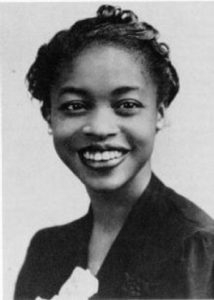
Margaret Walker
On this date, in 1915, Margaret Walker was born in Birmingham, AL. She was a Black novelist and poet.
After graduating from Northwestern University in Evanston, Illinois (BA, 1935), Walker joined the Federal Writers' Project in Chicago, where she began a brief literary relationship with novelist Richard Wright. She attended the University of Iowa (M.A. 1940) and wrote: "For My People" (1942), a critically acclaimed volume of poetry that celebrates Black culture in America. She recounts African American history and calls for a racial awakening in the title poem, originally published in Poetry magazine in 1937. Walker began teaching in the 1940s and joined the faculty at Jackson State College (now Jackson State University) in Jackson, Mississippi, in 1949.
She completed her first novel, "Jubilee" (1966), as her doctoral dissertation for the University of Iowa (Ph.D., 1965). Based on the life of Walker's maternal great-grandmother, Jubilee chronicles the progress of a slave family from the mid- to late-19th century. In "How I Wrote Jubilee" (1972), Walker traced the development of her story from her grandmother's oral family history through extensive historical research. Her second volume of poetry, "Prophets for a New Day" (1970), compares the biblical prophets with the Black leaders of the American Civil Rights movement. "October Journey" (1973) consists mainly of poems commemorating her heroes, such as Harriet Tubman, Gwendolyn Brooks, and her father.
After she retired from teaching in 1979, Walker published "Richard Wright: Daemonic Genius" (1988) and a volume of poetry titled "This Is My Century" (1989). Margaret Walker, one of the leading Black women writers of the mid-20th century, died Nov. 30, 1998, in Chicago.
Black Women in America: An Historical Encyclopedia
Volumes 1 and 2, edited by Darlene Clark Hine
Copyright 1993, Carlson Publishing Inc., Brooklyn, New York
ISBN 0-926019-61-9